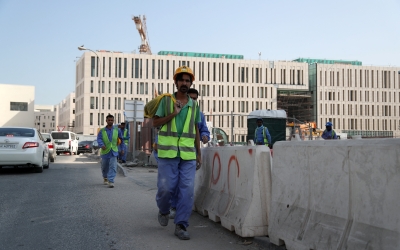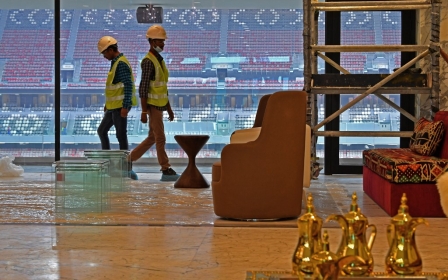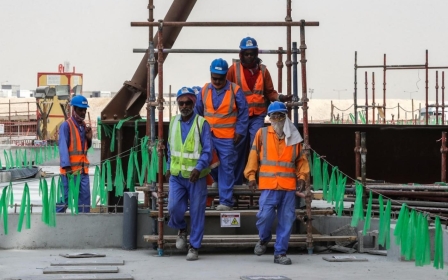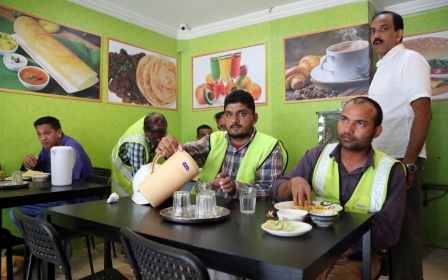Qatar World Cup 2022: Norway to 'show support' for migrant workers before qualifier

Players from Norway's national football team plan to protest against the abuse of migrant workers in Qatar ahead of their first World Cup qualifier on Wednesday, as calls grow for the team to boycott the football tournament.
Coach Stale Solbakken confirmed the plan during a press conference on Tuesday but refused to give further details on what his team planned to do.
"The word dialogue is very vague and very cowardly. There must be pressure. Direct measures must be taken to make things better," Solbakken told Norwegian broadcaster TV2 on Tuesday.
"It's about putting pressure on Fifa [football's governing body] to be even more direct, even firmer with the authorities in Qatar, to impose stricter requirements."
Norway last qualified for the World Cup in 1998.
Martin Odegaard, who will captain the team against Gibraltar on Wednesday evening, added that his teammates wanted to show their support and make a statement.
"I have the impression that a lot (of players) are interested in this, care about it and want to do something to try and contribute in a good way," said Odegaard on Tuesday.
Among the players who will join Norway's gesture for migrant workers include striker Erling Haaland, who has scored 33 goals in 31 games for German side Borussia Dortmund.
6,500 deaths
Several football clubs in Norway called for a boycott of the Qatar World Cup after the Guardian revealed that 6,500 migrants had died in Qatar since the World Cup was awarded in 2010.
Using data from several South Asian countries, the British paper's analysis showed that at least 12 people had died every week since Qatar won the rights to host the tournament.
They came from Bangladesh, India, Nepal, Pakistan and Sri Lanka.
Analysts fear the death toll is significantly higher, as official figures did not include deaths from Kenya and the Philippines, countries which send large numbers of workers to the Gulf state.
'Fifa has an opportunity to help leave Qatar a better place for migrant workers, but the clock is ticking'
- Steve Cockburn, Amnesty International
At least five Norwegian football clubs in the country's Eliteserien league joined calls for the boycott after the Guardian's report.
Norway's football federation will vote on whether it should play in the tournament during a special meeting in June.
A poll run by Norway's Verdens Gang newspaper revealed that 55 percent of Norwegians supported a boycott, with 20 percent against the idea.
In recent years, Doha has introduced a series of labour reforms following criticism of its treatment of migrant workers, but Human Rights Watch said last year that little had changed.
Earlier this week, Amnesty International called on Fifa to pressure Qatar to help end the abuse of migrant workers.
In a letter to Fifa President Gianni Infantino, Amnesty said it should "use the full extent of its influence" to demand Qatar fulfil its labour reforms programme before the World Cup kicks off.
“Fifa must take the concerns of the footballing community seriously and take concrete action. Fifa has an opportunity to help leave Qatar a better place for migrant workers, but the clock is ticking,” said Steve Cockburn, Amnesty's head of economic and social justice.
“Fifa and Qatar must put in place a robust plan of action to ensure the migrant workers across all sectors associated with the World Cup have been paid properly, treated fairly and are free from the control of exploitative employers.”
Middle East Eye propose une couverture et une analyse indépendantes et incomparables du Moyen-Orient, de l’Afrique du Nord et d’autres régions du monde. Pour en savoir plus sur la reprise de ce contenu et les frais qui s’appliquent, veuillez remplir ce formulaire [en anglais]. Pour en savoir plus sur MEE, cliquez ici [en anglais].





